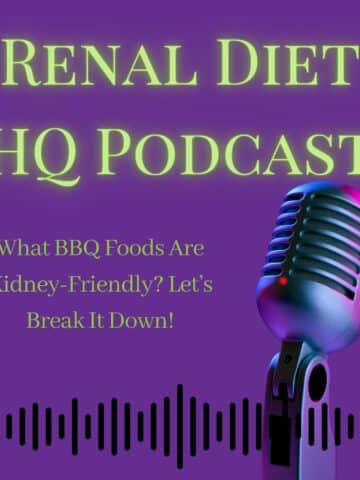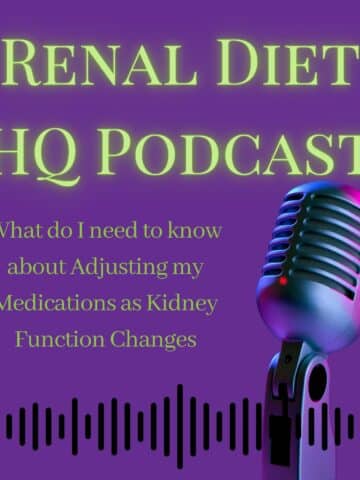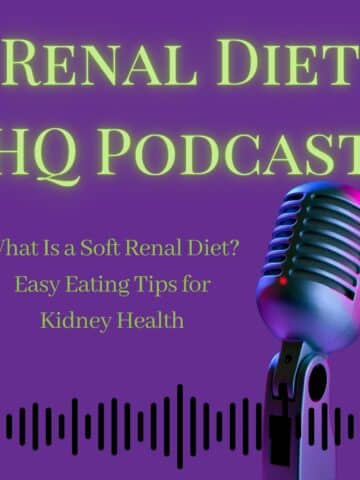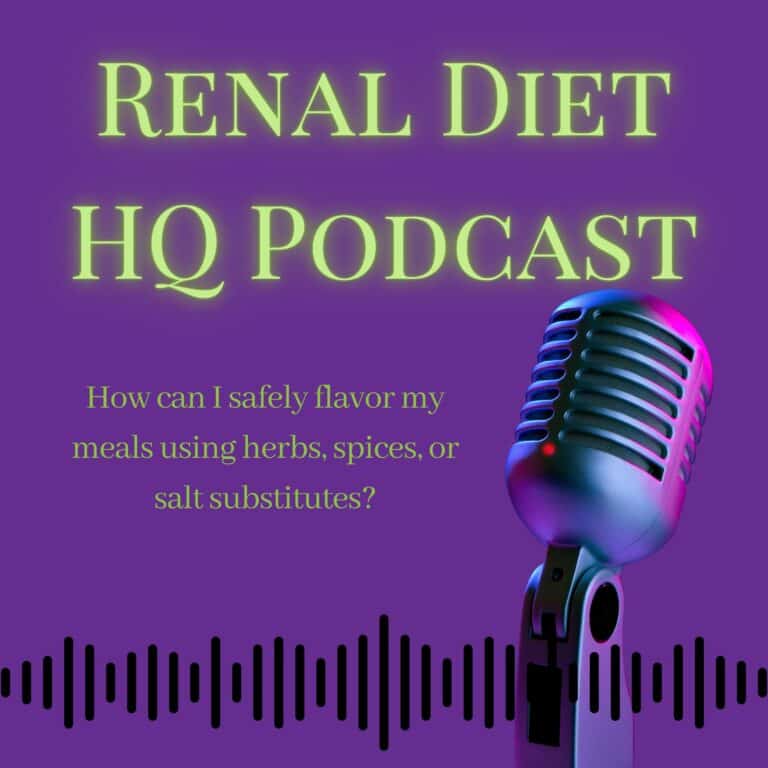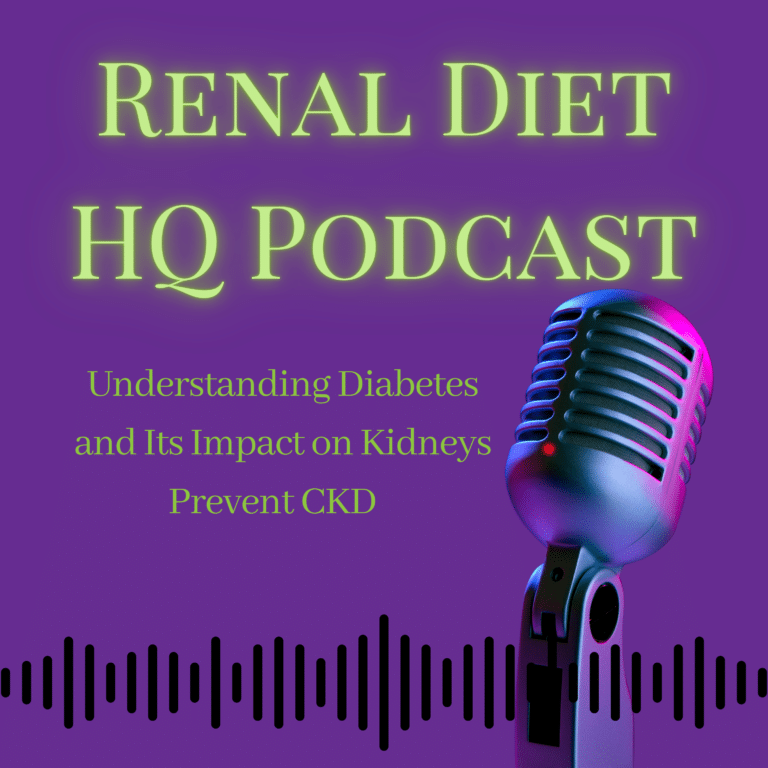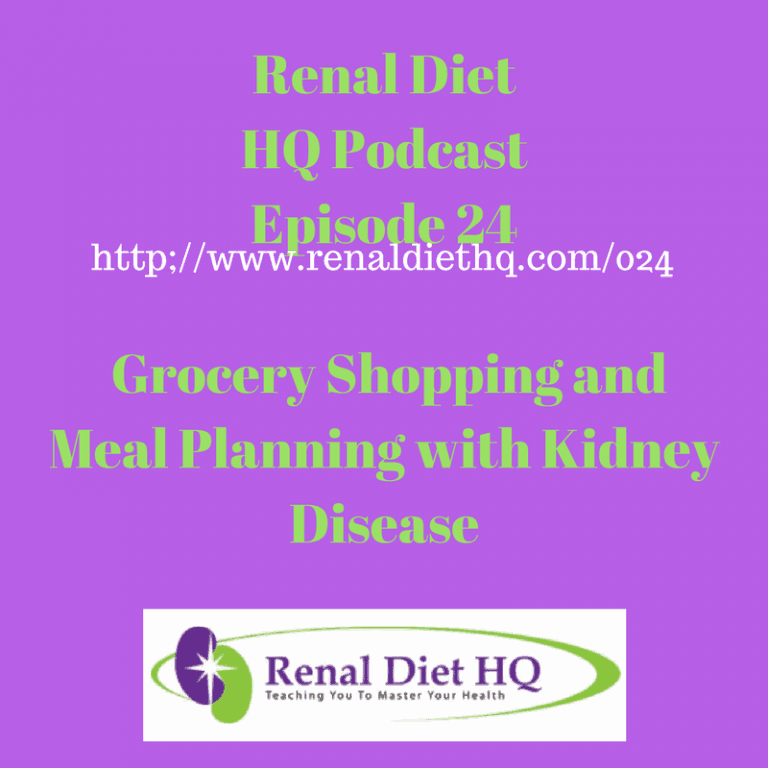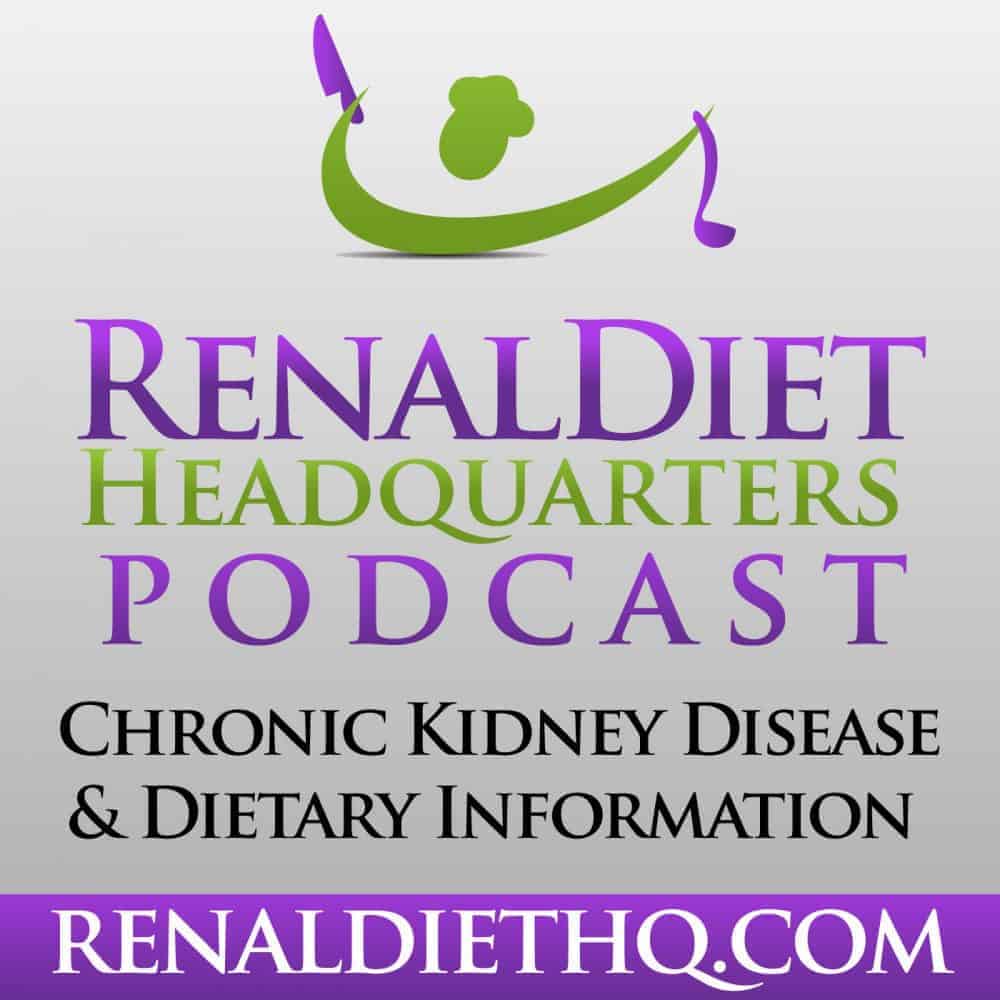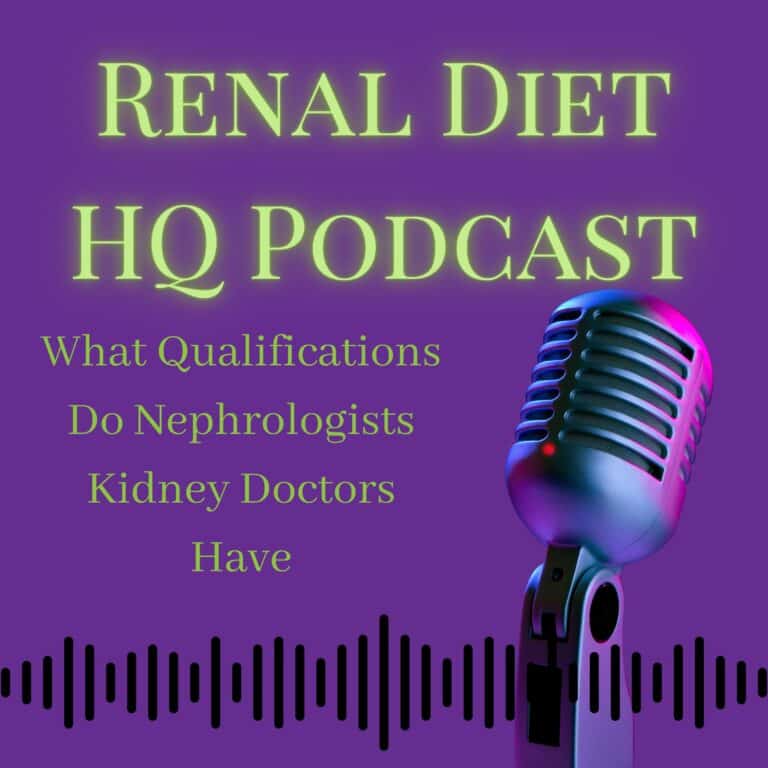What Are Different Types of Vegetarians?
Podcast: Play in new window | Download
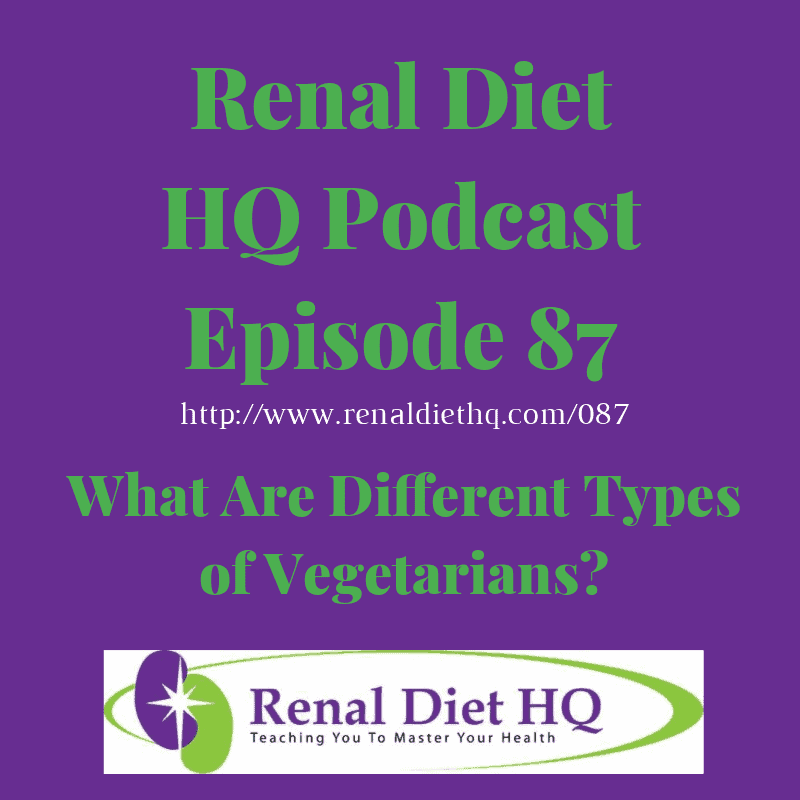
Hi there! It's Mathea Ford with Renal Diet HQ and today I want to talk to you about the different types of vegetarian and if it's healthy to eat more plant-based for you with kidney disease. So, I wanted to answer some of those questions because I've been getting a lot of those questions and as you may know I'm getting ready to release a vegetarian meal plan, 21 day meal plan. So, I've done a lot of studying on this so I wanted to kind of give you my thoughts on that.
So, let's first talk about the different types of vegetarianism. You often think that it's just not eating meat but there's a lot of layers to that. Vegetarians are you know they eat all kinds of protein so if you think of me as the only protein that's maybe where you're confused but a lot of times vegetarians eat plant-based protein whether they may be some animal products that contain protein and they get some of their vitamins and minerals from those but I wanted to go over kind of some definitions. So, what is a Vegetarian?
The Vegetarian Society defines a vegetarian as follows:
A vegetarian is someone who lives on a diet of grains, pulses, legumes, nuts, seeds, vegetables, fruits, fungi, algae, yeast and/or some other non animal-based foods. For example, salt with or without dairy products, honey and/or eggs. A vegetarian does not eat foods that consists of or have been produced with the aid of products consisting of or created from (that's a lot) any part of the body of a living or dead animal. This includes meat, poultry, fish, shellfish, insects, byproducts of slaughter or any food made with processing aids created from these. So, that's kind of a very general definition and I wanted to go into kind of some of the more popular types of vegetarianism.
So, there's the Lacto-Ovo Vegetarian which means that's one of the most common ones that we see with people. Lacto-Ovo Vegetarians still consume dairy and eggs so they're eating mostly plant-based and let me go over what plant-based means. So, plant-based is a term that a lot of people use and they may think it means you're vegetarian but what it really means is you're eating the majority of your food as plants or grains. The vegetarian type foods but you still might have meat, a smaller portion meat, chicken, eggs, all that type of stuff. So, plant-based just really means you're putting more plant products or vegetables, fruits, nuts, seeds, beans into your diet versus completely eliminating meat like a vegetarian would do. So, lacto-ovo vegetarians still consume dairy and eggs, they also eat cheese. So, a typical diet of a lacto-ovo vegetarian is going to have fruits, nuts, veggies, grains, seeds, herbs, milk, cheese, yogurt, eggs and this is the one that's most commonly accommodated in a restaurant. With my 21-day a vegetarian meal plan it will be a lacto-ovo vegetarian that you can adjust obviously if you don't want to eat cheese you just don't put cheese in the recipe. So, it's associated at lacto-ovo vegetarian you can it tends to have lower health risk and it improves your heart disease risk and it can reduce type-2 diabetes certain types of cancer. So, all those types of things.
A lacto-vegetarian means that so instead of a lacto-ovo vegetarian if you're a lacto vegetarian you do not consume eggs but you consume milk and other milk products like cheese and milk products. So, in other cultures that might be more normal to just not eat the eggs but have the milk products.
Ovo vegetarian is somebody that is going to skip the milk products and still consume eggs and if you're lactose intolerant this may work best for you so you're not going to have the milk the cheese the dairy but you are going to have the egg products which give you the protein and a little bit of fat in your diet. A lot of times people will drink almond milk soy milk to make up for the milk that non cow's milk in their diet.
There are Pescatarians which are people who eat they eat fish so that may not sound like it's vegetarian so it's not really but it's a type of more plant-based eating. So, they may eat fish and not eat other types of meat like chicken and beef and pork.
And then there's kind of the strictest a vegetarian which is a vegan and those people skip any animal products. So, they're not going to consume honey, they're not going to consume eggs, they're not going to consume gelatin, they're going to have the most plant-based. They're going to be making substitutes of their foods to eat more beans, more legumes, more pulses and can be more difficult to accommodate when you're you know not necessarily making your own food if you go to a restaurant. So, people having being a vegan, they tend to look for vegan restaurants. They're going to look for places that they can accommodate their meals without having like a vegan wouldn't even want butter used to cook their toast or anything like that because that's going to be an animal product.
So, there are some serious benefits to adopting a vegetarian meal plan and to eating more plant-based as a person with kidney disease. You're going to have some improvements with your grocery bill and the meat is going be the most expensive part of your diet. So, if you're eating more beans and legumes and grains and nuts and seeds those are going to be less expensive and
so you should see an improvement in your grocery bill but I would encourage you that if you're thinking about doing more vegetarian that you're going to do more farmers markets so that you can find fresh in season foods because at a farmers market you're going to be able to talk to that farmer, you're going to be able to get what they have done with their foods, how they cooked it, how they... They are not having to cook it but how they grew it, how they harvested it and know if that's going to fit in with that lifestyle.
You'll also know kind of what's in season. So, eating in season is going to be less expensive because you're not having to transport it. Strawberries weren't meant to be eaten year-round even though we have them in our stores
year-round. So, those are just some things that you can get locally that you can probably get and improve your diet and maybe even help your grocery bill a little but I want to I want you to know that if you want to eat more vegetarian, more plant-based.
I know people always consumed about that's concerned about potassium and phosphorus and I know that vegetables and fruits can tend to have a little bit more of that but what I want to encourage you is that if you want to eat more plant-based, more vegetarian, these types of foods are going to be better balanced with the diet that you want because meats tend to have more protein, more potassium, more phosphorus and so even if you had a vegetable as part of your meal and you have some beans which I know have higher amounts of potassium you're still probably eating a smaller portion of that and you're going to eat more leafy greens and vegetables so your overall balance is going to be improved by eating the more plant-based.
So, let's talk about some ways to incorporate a vegetarian more plant-based lifestyle. Find foods that you love so it's going to be easier to make the switch. So, if you like for example beans, a certain type of beans if you like kidney beans and I like white beans, navy beans. So, if you wanted to eat more of those you might try once a week having a way to incorporate those into a meal. You can make sure that you're eating things you know one day a week. Meatless Monday is a big deal that a lot of people do that can help reduce the amount of protein that they're eating and improve their diet by having like one day a week where they just make a meal that doesn't contain meat. It might have cheese, it might have eggs, it might have milk products but it doesn't contain that meat or that chicken or that beef and it's a little bit healthier because you're not getting those meat products.
Start slowly. You'll be surprised at how easy it can be to incorporate this but you if you start slowly it's easier to do. So, I always say to people that you really can incorporate these things but you just have to do them a little bit at a time.
So, pick a Meatless Monday meal. There's a website called Meatless Monday. Go there, pick something and it doesn't have to be on Monday but just incorporate that into your diet for the week and don't be hard on yourself.
So, it's hard to change to a new lifestyle and it's hard to do things a little differently and give yourself a little grace.
Its the new year. I know you might have made a new year's resolution to eat healthier to do better and so don't overwhelm yourself with doing all the things that you want to do. Just do a little bit at a time. So, if this is the week that you want to eat a little more you want to eat a little more plant-based maybe you find a farmers market in your area or maybe you find a you go to the grocery store and you pick up a couple more vegetables that you want to try to cook in your meals. If you watch your vegetables you can pay attention to which seem to go bad faster for example squash, like zucchini and yellow squash are going to hold on a little longer than like a lettuce.
So, if you're thinking about that and you're like “I know I want to cook this in the next couple days” you can maybe make a lettuce salad and if you're thinking about making a salad you can put some nuts and seeds on it, some beans, some chickpeas in there and you make a great salad. I personally love Brianna's Real French vinaigrette because it contains like very minimal ingredients, no sugar and it's really healthy and it's good. It's just I love vinaigrette so anyway but it's a delicious meal. So, I just want you to make these changes. Slowly make these changes that are important to you but pick a few and just go there with them and be kind to yourself when you're thinking about how you want to do these changes so I want to encourage you today to pick a couple things and make a little bit of change to eat a little more plant-based so look up some vegetable recipes just pick any vegetable at the store that you think your family would love to try and do that this week.
So, thank you very much for listening and please leave a comment and let us know any other questions that you have and I will talk to you soon.
Learn more About Renal Diet Podcast 086: Can You Eat Pasta with Renal Disease?
Learn more About A Vegetarian Substitute Called Jackfruit

